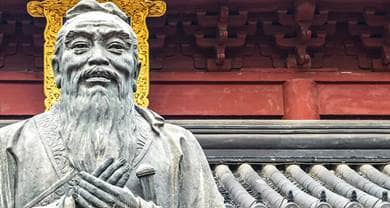- Trending:
- Pope Leo Xiv
- |
- Israel
- |
- Trump
- |
- Social Justice
- |
- Peace
- |
- Love

RELIGION LIBRARY
Confucianism
Exploration and Conquest
Confucianism is notable among the world's religious traditions for being associated neither with conquests nor crusades. After the final journeys of the Ming dynasty admiral Zheng He (1371-1435 C.E.), Chinese Confucian regimes showed little interest in global exploration, preferring to advance their interests through the "soft power" of civilizing influences directed abroad from the Chinese court.
This is not to say that Confucianism lacks connections to empire or racism. Its career as a prominent tradition in China began with its adoption by the Han dynasty, and virtually every East Asian regime of the past thousand years or more has endorsed Confucianism as its official ideology. This was due in part to China's overwhelming influence as East Asia's oldest and most imitated civilization. Ethnocentric attitudes are deeply rooted in some of the earliest Confucian traditions, according to which China's ancient Zhou dynasty essentially created the template for the best that human beings can be, do, or say. Confucian scriptures such as Lunyu 9:14 and 12:19 claim that "barbarians" (possibly in what now is Korea) cannot help but be transformed by the presence of a cultivated Chinese Confucian among them, while 3:5 maintains that even Chinese states bereft of rulers are better off than non-Chinese states that do have rulers. On the other hand, other Confucian scriptures such as the Mengzi as well as other passages in the Lunyu insist that Confucian self-cultivation is something of which all humans are capable, even if one is born into a cultural context that is less than favorable, such as a "barbarian" region.
 The spread of Confucianism across East Asia was accomplished largely through voluntary and consensual means, rather than by conquest or conversion. Although China controlled portions of the Korean peninsula and the Vietnam region early in the Common Era, by 1000 C.E. none of China's neighbors was under direct Chinese rule. The legacy of Chinese regimes, especially in Vietnam and Korea, did include extensive Chinese influence on the political, religious, and social development of non-Chinese cultures in East Asia. The diffusion of Confucianism from China to its neighbors led to the development of distinctive regional Confucian traditions, as described above. Historically, Confucian regimes in China, Vietnam, and Korea were not typically been regarded as aggressive or militaristic, and Confucian scholars often opposed war and other coercive measures in favor of leading by moral suasion and example. The embrace of Confucianism in Japan, however, by both the Tokugawa shogun's warrior government (1603-1868 C.E.) and the restored imperial government of the Meiji, Taisho, and early Showa periods (1868-1945 C.E.) entailed Confucian complicity in the expansion of Japan's territorial borders, war against Japan's neighbors, and the persecution of non-Confucian elements, especially Buddhist and Christian communities, within Japan.
The spread of Confucianism across East Asia was accomplished largely through voluntary and consensual means, rather than by conquest or conversion. Although China controlled portions of the Korean peninsula and the Vietnam region early in the Common Era, by 1000 C.E. none of China's neighbors was under direct Chinese rule. The legacy of Chinese regimes, especially in Vietnam and Korea, did include extensive Chinese influence on the political, religious, and social development of non-Chinese cultures in East Asia. The diffusion of Confucianism from China to its neighbors led to the development of distinctive regional Confucian traditions, as described above. Historically, Confucian regimes in China, Vietnam, and Korea were not typically been regarded as aggressive or militaristic, and Confucian scholars often opposed war and other coercive measures in favor of leading by moral suasion and example. The embrace of Confucianism in Japan, however, by both the Tokugawa shogun's warrior government (1603-1868 C.E.) and the restored imperial government of the Meiji, Taisho, and early Showa periods (1868-1945 C.E.) entailed Confucian complicity in the expansion of Japan's territorial borders, war against Japan's neighbors, and the persecution of non-Confucian elements, especially Buddhist and Christian communities, within Japan.
 Japan in the early 20th century C.E. may be the best example of a modern Confucian empire. Beginning with the restoration of direct imperial rule under the emperor Meiji in 1868, Confucian ideology (which was not associated with the failures of feudal society in Japan, unlike the case in China) was used to promote the image of the ruler as the father of the "family state" (kazoku kokka), to whom all his subjects owed filial obedience and respect. In 1890, the Japanese state promulgated the Kyōiku ni Kansuru Chokugo (Imperial Rescript on Education), which became required reading in Japanese schools and even the centerpiece of public rituals in which subjects pledged allegiance to the emperor. The text reads, in part: "Subjects, be filial to your parents, affectionate to your brothers and sisters; as husbands and wives be harmonious, as friends true; bear yourselves in modesty and moderation; extend your benevolence to all." The Japanese Confucian concept of the emperor as national parent gained strength from Confucianism's combination with Shintō religious traditions, wherein the emperor was understood as a kami (divine being) living among mortals.
Japan in the early 20th century C.E. may be the best example of a modern Confucian empire. Beginning with the restoration of direct imperial rule under the emperor Meiji in 1868, Confucian ideology (which was not associated with the failures of feudal society in Japan, unlike the case in China) was used to promote the image of the ruler as the father of the "family state" (kazoku kokka), to whom all his subjects owed filial obedience and respect. In 1890, the Japanese state promulgated the Kyōiku ni Kansuru Chokugo (Imperial Rescript on Education), which became required reading in Japanese schools and even the centerpiece of public rituals in which subjects pledged allegiance to the emperor. The text reads, in part: "Subjects, be filial to your parents, affectionate to your brothers and sisters; as husbands and wives be harmonious, as friends true; bear yourselves in modesty and moderation; extend your benevolence to all." The Japanese Confucian concept of the emperor as national parent gained strength from Confucianism's combination with Shintō religious traditions, wherein the emperor was understood as a kami (divine being) living among mortals.
The extension of Japanese power into Korea, Manchuria, Taiwan, and other Asian regions brought with it the expansion of Confucian traditions, albeit in forms designed to serve Japanese imperial interests, such as propagating the Imperial Rescript among Japan's colonial subjects. This Confucian rhetoric of empire persisted and intensified after the Meiji emperor's reign well into the 1930s and 1940s, when right-wing nationalist elements in Japanese politics won the upper hand and led Japan into a disastrous war of conquest that aimed to bring all of East Asia into a harmonious Kyōeiken (Co-Prosperity Sphere). The links between Confucianism and imperialism in Japan were severed when Japan surrendered to the Allies in August 1945 following the atomic bombing of the cities of Hiroshima and Nagasaki. In the aftermath of the war, the United States occupational administration forced Japan's emperor to renounce his religious status, and the Japanese state was forbidden to establish any religious tradition, Confucian or otherwise, as its official ideology.
 Partly in response to Japan's imperial ambitions, and partly in response to the threat of Western imperialism, Chinese rulers and intellectuals attempted to revitalize Confucian traditions in order to assert Chinese cultural and political independence. In the aftermath of the Boxer Uprising of 1900 -- during which anti-foreign sentiment inspired violent reprisals against bastions of Western colonialism in China, leading to a military response by Western nations, the capture of Beijing and the imperial palace, and the demand that China pay more than $300 million in reparations to Western powers -- the Empress Dowager Cixi (1835-1908) moved publicly to counter the impression that China was too hidebound by Confucianism to meet the challenges of modernity. Among the reforms that she sponsored was the abolition of the millennia-old Confucian civil service examination system in 1905. Ultimately, Cixi's reforms were unable to turn the tide of anti-imperial fervor in China, however, and the last emperor was deposed in 1912, just four years after her death.
Partly in response to Japan's imperial ambitions, and partly in response to the threat of Western imperialism, Chinese rulers and intellectuals attempted to revitalize Confucian traditions in order to assert Chinese cultural and political independence. In the aftermath of the Boxer Uprising of 1900 -- during which anti-foreign sentiment inspired violent reprisals against bastions of Western colonialism in China, leading to a military response by Western nations, the capture of Beijing and the imperial palace, and the demand that China pay more than $300 million in reparations to Western powers -- the Empress Dowager Cixi (1835-1908) moved publicly to counter the impression that China was too hidebound by Confucianism to meet the challenges of modernity. Among the reforms that she sponsored was the abolition of the millennia-old Confucian civil service examination system in 1905. Ultimately, Cixi's reforms were unable to turn the tide of anti-imperial fervor in China, however, and the last emperor was deposed in 1912, just four years after her death.
Despite these setbacks for Confucianism, post-imperial reformers active during the 1920s and 1930s also attempted to breathe new life into Confucian traditions. The Xin Shenghuo Yundong (New Life Movement) inaugurated by the Chinese Nationalist leader Chiang Kai-shek (1887-1975), who later ruled independent Taiwan after the victory of his Communist opponents in 1949, combined modern scientific elements -- such as basic hygiene and economic development -- with traditional Confucian moral principles such as li (propriety), yi (righteousness), lian (discrimination), and chi (shame). Later Chinese leaders, such as Singapore's founding prime minister, Lee Kuan Yew (b. 1923), championed Confucianism as the secret to the economic success attained by ethnic Chinese, especially in post-colonial Southeast Asia, and introduced Confucian moral education into Singapore's schools and universities. Thus, Confucianism has played a role in both imperialist and anti-imperialist campaigns during the 20th century.
Study Questions:
1. How did Confucian thought influence Chinese attitudes toward non-Chinese peoples?
2. How did Confucian traditions in Korea, Japan, and Vietnam compare with their Chinese antecedents?
3. What role did Confucianism play in Japan's modernization?
4. What role did Confucianism play in China's modernization?










